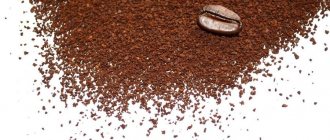Composition of coffee beans
Coffee is made from roasted beans of the coffee tree. There are more than 90 varieties of such plants in nature. Of the industrial varieties, Arabica and Robusta are most often used.
Coffee beans contain more than one thousand different components, 800 of them are aromatic substances that give the drink a unique smell. Grains contain:
- Carbohydrates provide the body with energy and contribute to the accumulation of nutrient reserves.
- Tannins (tannins) have astringent properties, have antimicrobial, hemostatic properties, and remove toxins in case of poisoning.
- Organic acids: malic, acetic, citric, oxalic, pyruvic acids take part in the metabolic processes of the body.
- Alkaloids: caffeine, theophylline, theobromine affect the nervous system, increase body tone, performance, and concentration. Regulates the level of glucose in the blood.
- Nicotinic acid is involved in the formation of digestive enzymes, lipid metabolism, and redox processes in the body.
- Chlorogenic acid has a pronounced antioxidant effect, has antiviral, hepatoprotective (protects liver tissue), and antitumor properties.
- Macro and microelements: calcium, iron, fluorine, sodium, magnesium, phosphorus, sulfur are involved in biochemical processes.
Is drinking coffee harmful? Spanish scientists have found that the peel of coffee beans contains a large amount of antioxidants (tannins), which are much stronger than vitamin C or green tea. These substances help remove toxins from the body. In addition, the shell contains plant fiber and phenols, which stimulate the gastrointestinal tract.
During roasting, the water content in beans decreases by 3 times. The calorie content of 1 cup of tonic drink is only 9 kcal, but if you add a little milk or dilute it with cream, the energy value of the product increases to 40–60 kcal.
Beneficial features
What are the benefits of coffee for the body?
- It has diuretic properties, therefore preventing the formation of kidney stones.
- The benefits of coffee are used to prevent constipation. The plant fiber contained in grains helps with this. Caffeine increases the acidity of gastric juice and stimulates increased liver function and bile production.
- Caffeine stimulates the nervous system, increasing efficiency, tones the body and eliminates drowsiness and headaches. The effect lasts 3–4 hours.
- The benefit of coffee for the respiratory system during bronchitis and pneumonia is the removal of phlegm, due to the content of tannins. In combination with lemon and honey, it strengthens the immune system, suppresses viruses, and enhances the antioxidant effect.
- A sugar-free drink is beneficial for the female body when losing weight. It promotes fat burning during exercise due to the increased tone and performance caused by caffeine.
- Coffee is known to be beneficial for hypotension, as it increases blood pressure.
- Due to its antioxidant content, coffee is a cancer preventative in women and men. Antioxidants protect cell structure from the effects of free radicals.
- The drink prevents Parkinson's and Alzheimer's diseases due to stimulation of the central nervous system. Drinking coffee prevents the destruction of brain cells.
- What are the benefits of coffee? Caffeine enhances the effect of medications such as Aspirin and Paracetamol, increasing the load on the liver.
- The drink helps with poisoning due to its antioxidant effect. Helps remove toxins from the body.
- Caffeine, when consumed in moderation (up to 300 ml per day), restores damaged liver cells, preventing cirrhosis.
The benefits of coffee appear only with moderate use of the drink; large doses (more than 300 ml per day) contribute to addiction and intoxication of the body.
Decaf Coffee: Pros and Cons
The caffeine-free product is a healthy alternative to the classic drink. Since caffeine has a generally depressing effect on the body, causing addiction, anxiety, insomnia, and constant fatigue , it is better to drink the drink without it. All negative effects (increased blood pressure, increased heart rate, liver problems) are caused by the action of this substance.
The caffeine-free drink also has its downsides. So, it lowers blood pressure. This is due to the diuretic effect, which is neutralized in a regular product due to caffeine. But this same property can benefit patients suffering from high blood pressure.
Regardless of the preparation method, it will not be possible to completely remove caffeine; at least 1–2% will always remain.
Caffeine content should be considered before offering coffee to pregnant women or children.
In general, decaffeinated coffee does not differ in aroma and taste from the regular version of the drink. It does not have an invigorating effect, so it can be consumed before bed.
Varieties of instant drink
According to the production method, instant coffee can be powdered, sublimated or granulated. Powder is prepared from roasted and crushed grains, soluble substances are extracted from the resulting mass, cooled, filtered, and dried with hot air.
The production of a granulated drink is identical, only at the end the powder is formed into granules using steam supplied under high pressure.
The freeze-dried product is prepared differently. First, a decoction of coffee beans is made and completely frozen; the resulting mass is dehydrated under low pressure. The product is then crushed into small, irregularly shaped pieces. The freeze-dried variety, unlike other types of instant drinks, preserves the properties and taste of natural grains as much as possible.
The beneficial and harmful properties of coffee in the form of powder or granules are manifested in lower caffeine content, so you can drink 4-5 cups every day. Harmful properties appear in case of overdose: the functioning of the heart, liver, and nervous system is disrupted. Cardiac activity, cerebral vessels, and the central nervous system are affected by increased blood circulation, and liver function is affected by increased acidity of gastric juice.
Freeze-dried coffee retains the same amount of caffeine as natural black coffee. It has the same effect on the body.
To add piquancy and variety to the popular drink, flavored varieties are produced with the taste of caramel, chocolate, vanilla, hazelnut, almond, honey, lemon, and alcoholic beverages. The flavored product in grains has become especially famous.
A refined taste is imparted by spraying flavored substances (essential oils) onto the grains, the inside of the package, and into the ground powder. What are the benefits of a flavored drink? The beneficial properties of coffee are the same as those of natural varieties. You just need to remember that a natural flavored product made from quality grains cannot be cheap.
How to store ground coffee
Depending on many factors, the quality of coffee can vary greatly. These factors primarily depend on the manufacturer. However, if stored incorrectly, there is a high chance that you will be disappointed with the taste of the coffee, even if it is the highest quality drink.
For proper storage, you will first of all need multi-layer bags with valves, vacuum packaging and, finally, a jar with a sufficiently tight lid.
To preserve the full aroma and taste of the drink, the grains must be ground before use. This is explained simply - all the taste qualities of ground coffee are very quickly lost.
If you really want to enjoy the taste of natural coffee, then you do not need to grind the beans every time, but simply knowing how to store such coffee correctly will be enough. Ground coffee should be purchased only in small portions and only grind the amount you expect to consume in about 4-6 hours. The main thing to remember is the “fierce” and main enemy of coffee – air. It is he who has such an effect on coffee, in which its essential oils oxidize and the coffee gradually ages. Usually, no more than five days pass from the moment of roasting and directly consuming the grains.
In order to reliably preserve the aroma, coffee should be stored in the vacuum packaging mentioned above and the lid should be tightly closed. Nowadays you can easily find in some stores special multilayer bags with valves that perfectly protect coffee from air penetration and also facilitate the unhindered release of essential oils, which has a positive effect on the taste properties of the drink and their preservation. Airtight foil packaging can also be a great help in preserving the aroma of your coffee. Being closed all the time, the aroma of coffee can last a whole year, but, again, only when closed. After opening the package, coffee should be consumed as soon as possible.
If you store coffee in soft packaging, then you need to roll it up as tightly as possible so that there is minimal air left in it. The edge of the package should be secured with tape or a clamp. This way, you will be better able to retain all the freshness and flavor.
When preparing coffee, it is better not to use a wet spoon, and in general it should be protected from any moisture in every possible way. It's best to keep the coffee dry.
Coffee addiction
Is coffee harmful to health? When taken correctly, the natural drink does not cause harm, and in some cases is even beneficial. Its systematic consumption of 3 cups every day can cause addiction (theism). A dosage of more than 4 cups can lead to intoxication of the body due to the effects of caffeine on the heart and central nervous system, anxiety, tremors of the limbs, confusion, and a severe headache.
Important! The safe daily dose of caffeine for humans is 300 mg. More than 90 mg of caffeine (1 cup) per 1 kg of body weight, drunk in a short period of time (2-3 hours), can lead to death. The load on the heart increases, blood circulation is impaired and death can occur!
Caffeine tones the nervous system, improves mood, and increases performance. Therefore, it causes psycho-emotional addiction. A dependent person without drinking coffee feels irritation, headache, decreased performance, and drowsiness.
Methods for preparing the drink
Freeze-dried coffee with milk: harm or benefit? When preparing the drink, it is not recommended to add sugar to it; it is better to drink it with honey. The benefit of coffee with milk or cream is that caffeine flushes calcium from the body, and milk replenishes this microelement. The drink retains all the harmful and beneficial properties of natural coffee.
When milk is added to a drink, calcium mineral salts accumulate in the kidneys and stones form.
Natural coffee, the benefits and harms of its use for women and men are manifested in an increase in the overall tone of the body. The negative effects of the drink cause disruption of the heart, liver, and nervous system. Blood circulation increases, which increases the load on the organs of the cardiovascular system. Increased stomach acidity after drinking coffee increases the load on the liver.
Flavored coffee beans are ground and brewed in a Turkish coffee pot. There is no need to dilute the drink with cream or milk so as not to spoil the taste of the additives. The freeze-dried or granulated soluble product is brewed with boiling water. You can add 2 tablespoons of milk to reduce bitterness, and honey instead of sugar.
You can add a slice of lemon to any type of coffee, this will give the drink a special taste and aroma. Citrus zest, cloves, and cinnamon are also used. Drinking lemon will help replenish vitamin C, potassium, phosphorus and magnesium, which caffeine removes. Lemon has a beneficial effect on the condition of blood vessels, while neutralizing the effect of caffeine.
Thanks to the content of potassium and magnesium in lemon, blood pressure is normalized, which increases drinking coffee. Therefore, a drink with the addition of a slice of lemon is less harmful.
Coffee with lemon and honey is also useful in the treatment of colds, since caffeine removes phlegm, and citrus strengthens the immune system, fights viruses, and relieves inflammation. Honey is a powerful antioxidant and reduces the harm from drinking coffee.
To add to a tonic drink, it is best to use linden and buckwheat honeys; they help reduce the bitterness of natural coffee. You need to prepare a drink with honey correctly; the bee product is added to a warm drink (50˚), otherwise all the beneficial properties of honey are lost.
A few facts about instant coffee
Instant coffee has the following features:
- Its quality is much lower than that of a grain drink; the consumer cannot control which grains were used to prepare instant coffee.
- To obtain different tastes, for a beautiful appearance and aroma, manufacturers often add chemical ingredients (antioxidants, stabilizers, dyes, flavors) to the product.
- The benefits and harms of instant coffee for the body are approximately the same as those of a grain drink, but they are much less pronounced.
Harmful effects
What harm does coffee cause to the body?
- Due to its diuretic properties, coffee flushes calcium from the body and, at the level of brain activity, dulls the feeling of thirst. This occurs due to impaired blood circulation in the blood vessels of the brain when drinking coffee. This condition threatens dehydration.
- It is harmful to drink an instant drink (powdered, sublimated or granulated) in the morning on an empty stomach; it irritates the mucous membranes of the gastrointestinal tract, causing an exacerbation of diseases.
- Caffeine on an empty stomach creates an acidic environment in the stomach due to its chlorogenic acid content. This leads to the formation of heartburn.
- Drinking caffeine (more than 300 mg per day) is harmful. Diluting the drink with cream or milk does not reduce the caffeine level, so the harmful effects of the drink remain the same.
- The harm of coffee is to increase appetite due to accelerated digestion of food. Therefore, when losing weight or excess weight, you need to control the amount of drink consumption.
- Coffee can cause great harm if you drink it immediately after a meal and disrupt the digestion process. The drink, when mixed with food, negatively affects the primary processing of food by stomach enzymes.
- Coffee causes staining of tooth enamel. Carbohydrates cause the formation of persistent pigmentation on the surface of teeth.
- Dehydration and calcium loss negatively affect the functioning of the heart and brain.
- Coffee grounds contain tannins, which increase the acidity of the stomach and cause exacerbation of diseases of the digestive tract.
- Drinking flavored coffee beans in the morning on an empty stomach, after which nothing was eaten, causes gastric juice and hydrochloric acid to digest the walls of the empty stomach. With systematic use, the development of peptic ulcers is possible.
- A sharp increase in pressure by 10 mm Hg, an increase in the load on the heart and blood vessels can lead to disturbances in the functioning of the heart and brain. This threatens heart attacks and strokes. To prevent the drink from increasing blood pressure, you need to add lemon to it; the fruit contains potassium and magnesium, which are necessary for the normal functioning of the vascular system.
- Coffee increases the content of cholesterol plaques in the blood due to the content of caffestol, which is involved in the transport of bile from the liver.
Harm to women's health
How is coffee harmful for pregnant women? The drink dilates blood vessels and can increase blood pressure. This is dangerous for the health of the expectant mother, as involuntary abortion, bleeding or premature birth may occur. A dangerous dosage is more than 2 cups every day. If there are disturbances in the functioning of the heart and vascular system in the expectant mother, children may be born with underweight and anemia.
The harm of coffee for young women is to reduce the possibility of conceiving a child by 40%. This happens because caffeine changes hormonal levels and negatively affects ovulation and contractility of the fallopian tubes.
For pregnant and lactating women, the harm of coffee lies in the negative impact of caffeine on the baby’s nervous system. Due to the diuretic properties, calcium is washed out, the child’s baby teeth will quickly deteriorate, and the mother will lose her permanent ones.
Important! With frequent coffee consumption, women need to replenish fluid loss in the body. You should drink at least 2 liters per day of pure still water every day.
Systematic use of a soluble freeze-dried product without constant physical activity leads to the formation of cellulite in women on the thighs and abdomen. The drink disrupts blood flow and contributes to impaired water metabolism, and these are the main reasons for the formation of “orange peel.”
The benefits of black coffee
The beneficial substances contained in coffee have the ability to prevent the development of gallstones, asthma, Parkinson's disease, diabetes, breast cancer and cirrhosis of the liver. Serotonin (the hormone of happiness), improves mood and fights symptoms of depression. The drink increases blood circulation in the brain, thereby making it work better.
Caffeine stimulates the nervous system, which leads to improved memory, thinking (creative and associative) and attention, and also increases blood pulsation and dilates blood vessels. Coffee speeds up metabolic processes in the body, promoting weight loss.
If you have hypotension (low blood pressure), it is recommended to drink a couple of cups of coffee a day, this will bring your blood pressure back to normal. In limited quantities, the drink is useful for dystonia, as it has a vasodilating effect.
Harm to men's health
What is the harm of coffee for men? When drinking a flavored drink, the level of testosterone in the blood of representatives of the stronger sex decreases. Microelements necessary for the functioning of the prostate gland (magnesium, zinc, vitamins A, E) are excreted in the urine, and sexual desire decreases.
Caffeine stimulates the production of the stress hormone and the release of adrenaline into the blood. The male body perceives this as a decrease in the need for testosterone.
The harm of coffee for the male body lies in the risk of developing enuresis (urinary incontinence). American scientists have found that drinking 3 cups of natural drink per day increases the likelihood of developing urinary incontinence by 70%.











